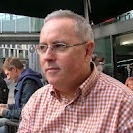Latest News
Kitchen Chat and more…
Kitchen Chat and more…
The Christian Community in North American congratulates and warmly welcomes two newly ordained priests! Ann Burfeind and Darryl Coonan were both ordained this past March in New York, and we would like to introduce you to them here.
 Rev. Ann Burfeind was born in Chicago and grew up on a farm in the upper Midwest. She was a Waldorf class teacher in Milwaukee, Wisconsin, and for many years worked, in various capacities at the Christian Community summer camp in the Midwest. Earlier this year she completed the Seminary curriculum in Stuttgart, Germany, and was ordained on March 18th, in Spring Valley, NY. Rev. Burfeind is now returning to her roots in the Midwest as a priest in the Christian Community in Chicago. Welcome back Ann!
Rev. Ann Burfeind was born in Chicago and grew up on a farm in the upper Midwest. She was a Waldorf class teacher in Milwaukee, Wisconsin, and for many years worked, in various capacities at the Christian Community summer camp in the Midwest. Earlier this year she completed the Seminary curriculum in Stuttgart, Germany, and was ordained on March 18th, in Spring Valley, NY. Rev. Burfeind is now returning to her roots in the Midwest as a priest in the Christian Community in Chicago. Welcome back Ann!
 Rev. Darryl Coonan is a native of Australia and lived there until he entered the Seminary in Chicago, in 2008. During his time in his home land, he worked as a nurse for 13 years. His experience working as a community health nurse led him to further his education to more effectively work with drug dependence and mental illness. He went on to complete four graduate level programs, which he then utilized in his work in the field of addictions, major psychiatric conditions, and in his own private psychotherapy practice.
Rev. Darryl Coonan is a native of Australia and lived there until he entered the Seminary in Chicago, in 2008. During his time in his home land, he worked as a nurse for 13 years. His experience working as a community health nurse led him to further his education to more effectively work with drug dependence and mental illness. He went on to complete four graduate level programs, which he then utilized in his work in the field of addictions, major psychiatric conditions, and in his own private psychotherapy practice.
Rev. Coonan completed his Seminary studies and training at the Seminary in Stuttgart, Germany, earlier this year and was ordained in the Taconic-Berkshire Community in New York, on March 16, 2012. He is presently visiting with the Boston congregation and their affiliates in New Hampshire and Maine. A member of the Christian Community since 1997, Rev. Coonan has a 30 year old daughter and two grandchildren who currently live in Melbourne, Australia. Welcome Darryl!
The season during which we celebrate the Sacrament of Confirmation is upon us! Please join one of our communities listed below as they celebrate this special time in the lives of the young people being confirmed as well as a very significant event for the entire community. Your participation is a gift to the youth.
Philadelphia/ Devon, PA – April 15th
Vancouver, Canada – April 15th
Chicago, IL – April 22nd
Taconic-Berkshire – April 22nd
Sacramento, CA – April 29th
Spring Valley, NY – April 29th
Montreal, Canada – May 5th
Denver, CO – May 13
Let us love the trees,
to us the trees are good.
Within their shoots of green
streams God’s own living blood.
Once the wood did harden,
so Christ hung thereupon.
To nourish us with new food
eternal flow’ring was won.
(Albert Steffen 1921)[i]
HOLY WEEK AND TREES
Trees permeate Holy Week. On Palm Sunday branches are torn from trees (Gk: den’-dron) and placed on the road into Jerusalem (Mt 21:8). On Monday the fig tree (soo-kay’) is cursed, on Tuesday it is dead (Mk 11:13, 20). Also on Tuesday, in his apocalyptic discourse, Christ says: “Observe the fig tree and all the other trees (den’-dron).” (Lk 21:29).[i] On Thursday he refers to himself as the vine (essentially a water-laden prostrate tree) (Jn 15:1-5). On Good Friday Christ says: “…if they do these things when the wood (or ‘tree”) (xoo’-lon) is full of water (or “green”), what will happen when it is dry” (Lk 23:31)[ii]

